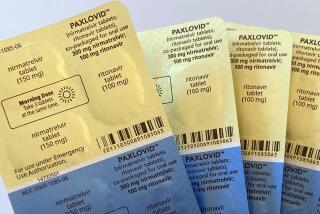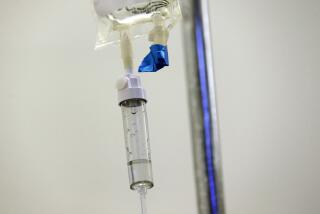FDA Set to Approve 2 Generic Drugs for Inhaled Anthrax
- Share via
To stave off panic and hoarding of the name-brand antibiotic Cipro, the U.S. Food and Drug Administration this week is expected to approve two common antibiotics for treatment of the virulent inhaled form of anthrax.
The move comes as supplies of Cipro are dwindling so quickly that pharmacies and wholesalers have begun to ration it.
“We hope that this will make the lay public understand that there are alternative antibiotics available,” said Dr. Janet Woodcock, director of the Center for Drugs at the FDA.
The remarkably fast approvals, for the generic drugs penicillin and doxycycline, are expected to be made final in the next few days. Penicillin and doxycycline have long been used by doctors to treat inhaled anthrax, but a bureaucratic glitch left them without official approval: Because the drugs are generic and not considered to be big moneymakers, nobody bothered to apply to have them officially approved for that use.
The FDA, contrary to its usual practice, decided to offer the approval anyway.
“Penicillin and doxycycline were tested in the same study as Cipro,” Woodcock said.
Demand for the powerful and expensive Cipro has become overwhelming, and it grows with each new anthrax scare.
“Right now, we have less than a week’s supply,” said Larry Kurtz, spokesman for McKesson Corp., one of three major pharmaceutical wholesalers. “It’s really quite dangerous, what is happening.”
Public health officials say that the drug can have dangerous side effects, and that indiscriminate use of it could make some infections resistant to treatment.
At St. John’s Hospital and Medical Center in Santa Monica, the pharmacy ran out of Cipro over the weekend, forcing a severely ill patient whose doctor had prescribed it for an infection to use a different medication.
“I wanted to start a patient on Cipro, and they didn’t have any in the pharmacy,” said Dr. Peter Katona, a UCLA-based infectious disease specialist.
Katona’s patient was infected with a bacterium called pseudomonas, which can cause dangerous infections in cancer or burn patients, those with cystic fibrosis and others with compromised immune systems. Cipro is commonly prescribed. Katona said the drug he prescribed for his patient was “not optimal, but it was adequate.”
Approval of penicillin and doxycycline “helps, because now Cipro is not the only drug,” said Richard Andersen, St. John’s pharmacy team leader. The pharmacy now has a small amount of Cipro on hand but cannot get more from its local distributor.
McKesson, which normally sells 40,000 bottles of Cipro in a month, sold 93,000 in 10 days, Kurtz said.
Other wholesalers reported similar demand and said some distribution centers have run out.
The companies have begun to limit the amount of Cipro that a pharmacy can buy to the amount the store has purchased previously.
But pharmacists are so desperate that many are trying to circumvent the restrictions, sending in scores of orders per day as a way to trick distributors’ computers into authorizing the sale of more pills.
Pharmacies have also begun to ration the drug, many limiting patients to a seven-day or 14-day supply, not the 60-day supply that might be required for some stubborn anthrax infections.
“I’m limiting those prescriptions to 30 tablets each,” said pharmacist Chet Yee of Menlo Park Pharmacy in Menlo Park, Calif.
Parents are so frantic to buy Cipro that they insist upon it for their children--even though it can harm the cartilage in their growing joints and injure their kidneys, Yee said.
“I’ve had two pediatricians call and order Cipro at the prodding of parents, even though the guidelines for this medication say it should not be given to infants and children,” Yee said.
Several customers have begged him to fill prescriptions for relatives in New York and Florida, where Cipro is becoming particularly hard to get, he said.
Formal approval for penicillin and doxycycline, while expected to loosen supplies and bring the price down dramatically, could nonetheless continue to spur hoarding and put patients at risk for allergic reactions and other side effects.
Dr. Laurene Mascola, chief of acute communicable disease control for the Los Angeles County Department of Health Services, praised the FDA’s action. She said that doctors have always considered penicillin and doxycycline safer than Cipro, and more appropriate as the first drugs to try if a patient is infected with anthrax.
But she questioned why the FDA has gone to the trouble of approving the two older drugs for that use, while ignoring several antibiotics in the same family as Cipro, called fluoroquinolones. These broad-spectrum antibiotics work against a great variety of bacteria.
While penicillin and doxycycline work against most naturally occurring forms of anthrax, it is generally believed that if bioterrorists were to genetically modify the bacteria, they would try to create a strain that resists the older drugs.
“It gives a false sense of security,” Mascola said, “because if it really is a genetically engineered organism, it’s going to be resistant to penicillin.”
More to Read
Sign up for Essential California
The most important California stories and recommendations in your inbox every morning.
You may occasionally receive promotional content from the Los Angeles Times.













